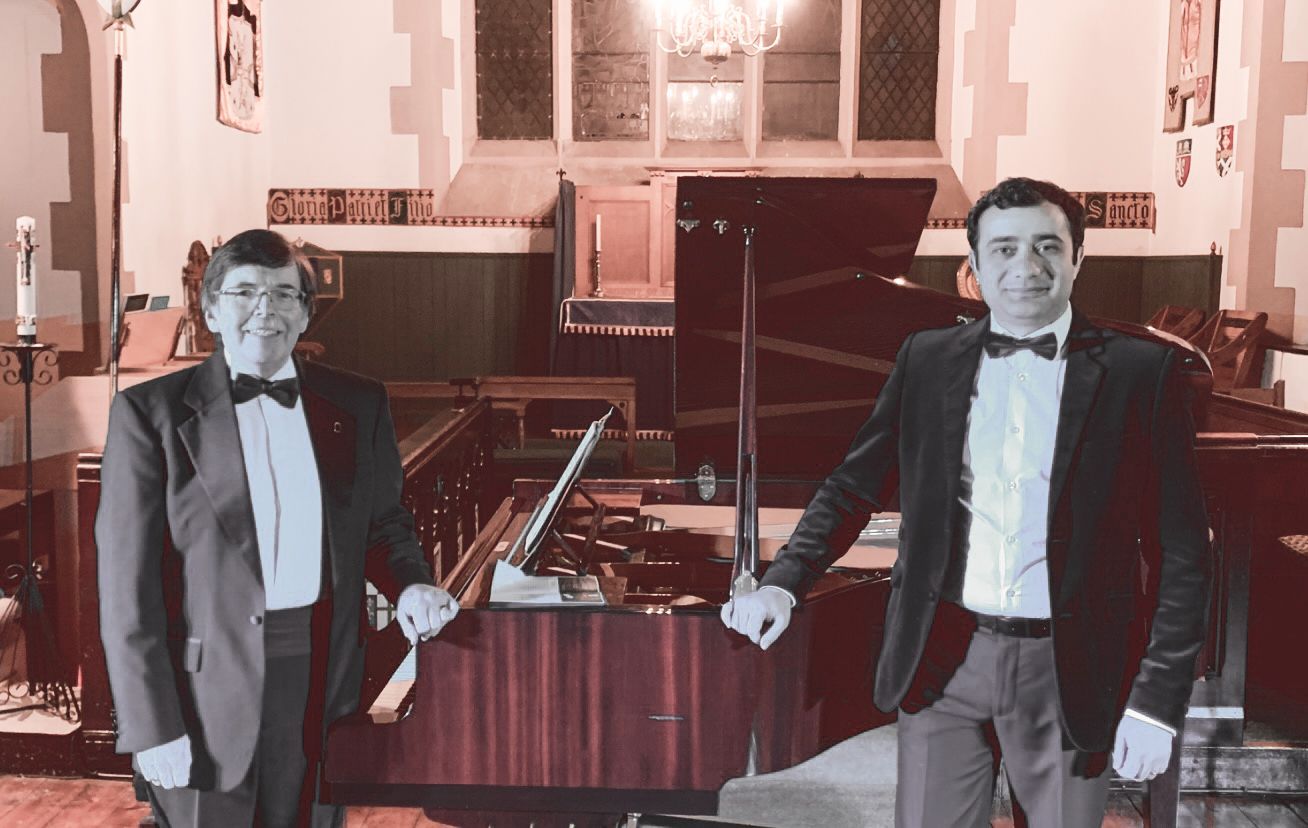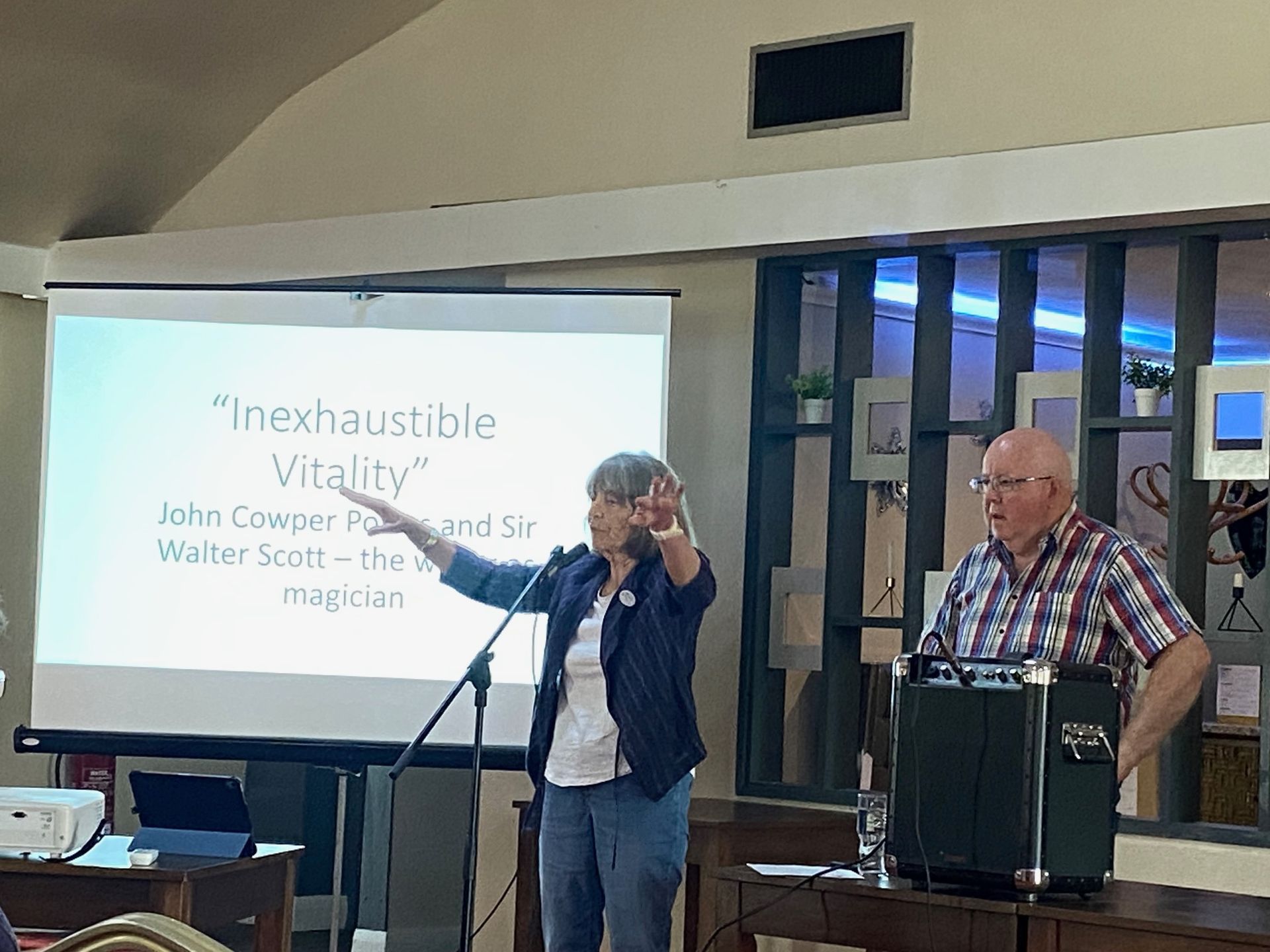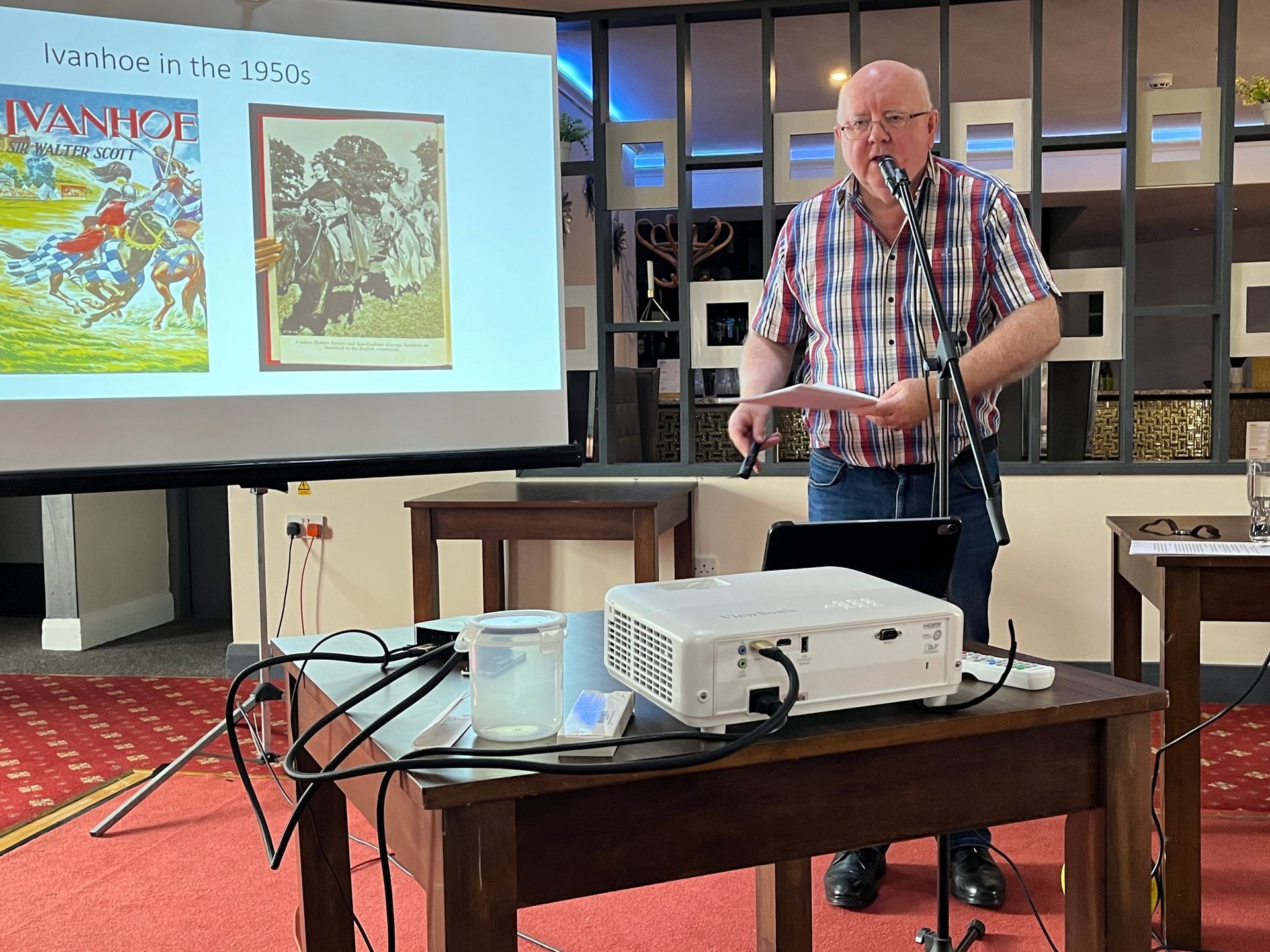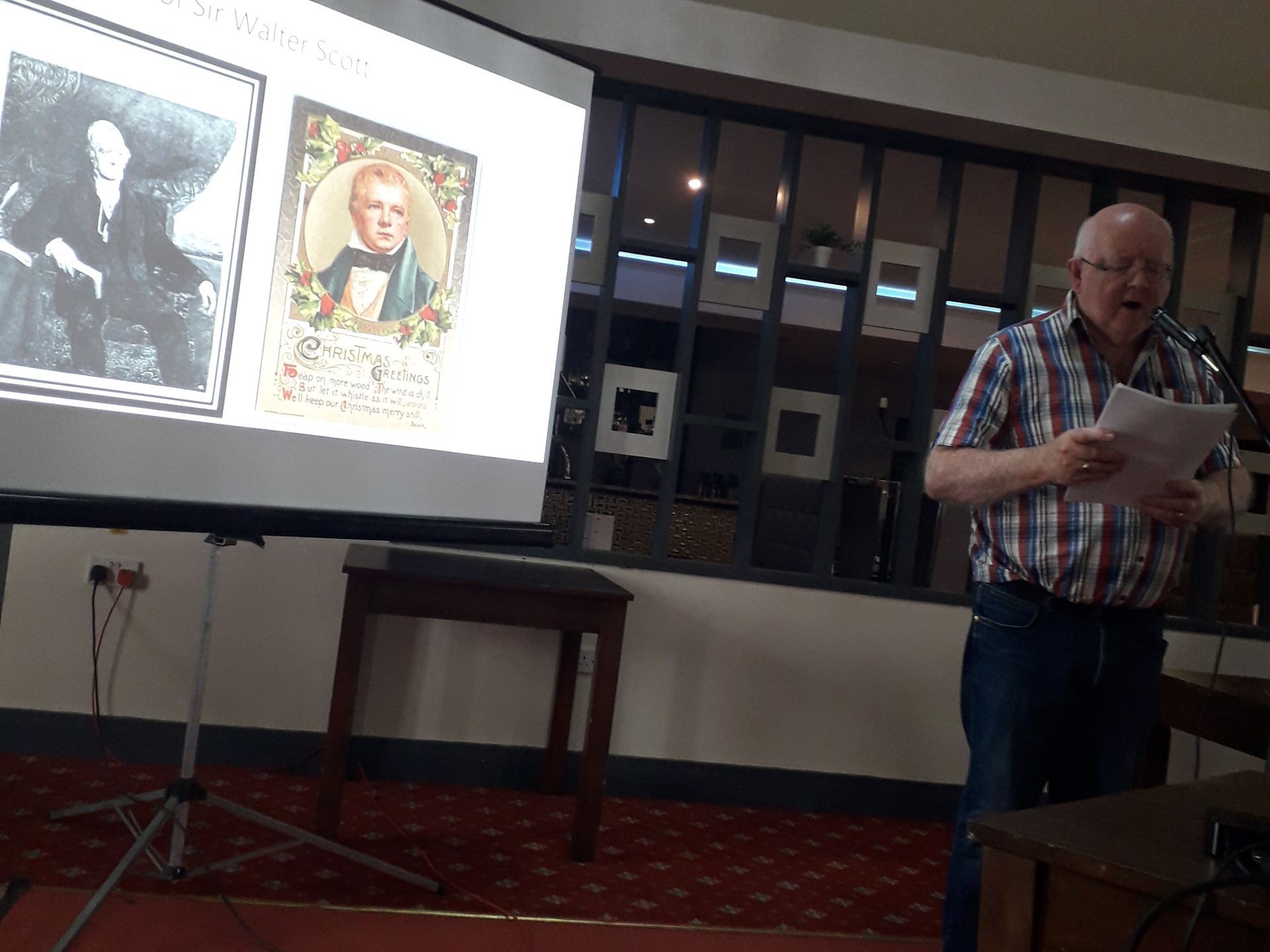Public Engagement Fund
Applications are invited for financial support from our Public Engagement Fund*.
Launched in 2021 to celebrate the 250th anniversary of Scott’s birth, this fund offers up to two awards per year of a maximum of £150 towards public events held in the United Kingdom that help to facilitate the Club’s stated aim ‘to advance the education of the public concerning the life and works of Sir Walter Scott’.
Events may therefore take the form of talks, lectures, performances, readings, discussions, excursions, exhibitions, educational activities, and anything else that shares some, if not all, of the Club’s objectives. Applications are particularly welcome for events that seek to introduce Scott to new audiences and look to reappraise him for the present day.
For events taking place within a 10-mile radius of Edinburgh, the Club is happy to provide further support in the form of audio and visual services free of charge for up to 1 hour per event (subject to availability).
In return, we ask that successful applicants include mention of The Edinburgh Sir Walter Scott Club as a sponsor -- including use of its [logos] on materials relating to the event and provide us with a short blog entry, featuring a description and photos from the event, for use on the Club’s website.
Applications are invited and awarded twice yearly, in Autumn and Spring. Please click on the button below to complete the application form by 1st March (for consideration in Spring) or by 1st September (for consideration in Autumn)
Applications will be assessed by members of the Club’s Council and applicants can expect to be informed of a decision within six to eight weeks from the date of the relevant deadline.
*This fund is still referred to as the Public Lecture Fund with OCSR. We changed the name internally in 2025 to reflect it's wider purpose.
Previous recipients:
2024: Powys Society
Public Lecture: Inexhaustible Vitality: Sir Walter Scott & John Cowper Powys by Patrick Quigley
Patrick' talk will draw on the insights of Ann Rigney’s The Afterlives of Walter Scott, which traces how Scott’s reputation has been changed and sustained for over two centuries – an approach that offers possibilities for promoting the rich cultural heritage of the Powys family. Critics have highlighted convergences between Scott and Powys in their stress on the influence of landscape over the individual and the romantic appeal of the lost cause. In Owen Glendower Powys emulates and surpasses the grandeur, spaciousness and reverence for life of his Scottish inspirer. Powys returned to his childhood for inspiration in his historical romance Porius where the Scottish mage, Michael Scott, and scenes from The Lay of the Last Minstrel are transformed and reimagined. Powys claimed that Scott was the most formative influence on his literary work. During childhood days in Montacute when his mother recited Scott’s epic poem, The Lay of the Last Minstrel, the Scottish writer became imbued with an aura combining magical power with the spell of story-telling. Scott became part of the furniture of his mind.
Patrick rediscovered Sir Walter Scott last year following a visit to Abbotsford which coincided with his invitation to give a talk to the Powys Society conference in 2024 about the influence of Sir Walter on the writings of John Cowper Powys. He is currently reading through all the Waverley Novels and the forthcoming conference is an opportunity to convey his enthusiasm to an audience of literary readers. About 50 people will attend the conference – talks are open to the public for a small fee. All assistance from the Edinburgh Club will be acknowledged in advertisements for the conference, on the Powys Society website, www.powys-society.org, in the Powys Society Newsletters and the talk will be printed in the Powys Society Annual Journal. It is his aim to encourage as many people as possible to read Scott’s wonderful work and to support the vital activities of the Edinburgh Sir Walter Scott Club.
How the funding helped:
Patrick's talk on the influence of Sir Walter on the writings of John Cowper Powys went down very well. There was an audience of c.40 Powys Society members and friends in the Wessex Hotel, Street, on Sunday 18th August.
He quoted John Cowper's Autobiography where it was claimed that Scott was the greatest literary influence in his life. His early novels were more in the vein of Thomas Hardy, but on moving to Wales in 1935 he began to write historical novels which reflected Scott's influence in many ways. Quotations from the books, from letters and critical commentary supported the case that Powys depended strongly on Scott in such books as Owen Glendower (1940) and Porius (1951).
Patricky was able to use the Club's logo on a handout for the talk. An edited version of the talk will appear in the Powys Journal 2025 edition
2023: Walter Scott Research Centre, University of Aberdeen
Telling and Retelling Supernatural Tales (at Abbotsford) an
Interactive, multimedia showcase of collected traditional supernatural tales and creative writing workshop
In his poems and the long notes that accompany them, Walter Scott often explores traditional tales and folklore from Scotland and other countries and cultures, especially stories involving the supernatural, and recognises that they exist as part of a transnational ‘community of fable’. Following Scott’s lead, this project will gather tales from Scotland and communities now living in Scotland, focusing on stories from the oral tradition with supernatural features. The collected tales will then be used for a series of events at the Being Human Festival (9-18 November 2023). Interactive workshops will invite participants to consider why these stories persist, what such stories mean to them, and provide opportunities to create new communities of fable through creative writing and storytelling.
One of our workshops will be held at Abbotsford, Scott’s home in the Scottish Borders, where his fascination with supernatural stories and local folktales is represented by his library and the recently opened Witch Corner folklore trail. The historic house and gardens are an extremely significant cultural heritage site for the area so this event has the additional benefit of being a place-based activity that will further highlight the supernatural aspects of local tales, traditions and history, their importance to Scott, and their enduring relevance to local communities. Beginning with an interactive multimedia exploration of supernatural stories from Scotland and folktales from other countries and cultures, a creative writing workshop will then use these tales to help attendees write their own modern-day supernatural story.
This event was inspired by research on the Edinburgh Edition of Walter Scott’s Poetry, currently being led by Aberdeen. Our activities are designed for the Being Human Festival, which aims to create opportunities for researchers to engage with non-specialist audiences. Our series of events will bring communities together, enhance public awareness and understanding of Walter Scott’s work, and preserve some of the traditional tales that form a significant part of our intangible cultural heritage. By working with our well-established partners at Abbotsford we aim to reach a wider audience and engage the Borders community.
While the supernatural tales that Scott passes on through his poetry are grounded in local communities this connection is often forgotten. Scott’s emphasis on the transnational nature of these tales reminds us that traditional stories have their counterparts across the globe and that these have been brought to a new multicultural Scotland. With this in mind, we aim to capture stories that arise from Scotland’s communities, engage new communities who bring their stories to Scotland through migration, and re-establish the connection between these stories and the work of Walter Scott. By doing so we aim to encourage a cross-cultural discussion of local heritage and aid in the formation of new communities of fable through shared experiences and traditions. Above all we aim to advance understanding of Scott and his relevance today for a diverse cross-section of the public, bringing them to Abbotsford to re-discover the connections between their own stories and those he preserved.
2021 Opera Caledonia
Opera Caledonia's “The Music of Sir Walter Scott” presents a classical voice and piano recital featuring a programme of operatic arias taken from operas based on the novels of Sir Walter Scott. Armenian baritone Arshak Kuzikyan, whose recent engagements include performances with English Touring Opera, Grange Park Opera and at Wigmore Hall will perform alongside Derek Clark, Head of Music at Scottish Opera. Interspersed with readings from Sir Walter Scott’s novels, the programme will include arias taken from Donizetti’s “Lucia Di Lammermoor” (The Bride of Lamermoor) and Il castello di Kenilworth (Kenilworth), both Rossini and Arthur Sullivan’s Ivanhoe and Bizet’s La jolie fille de Perth (The Fair Maid of Perth) amongst others. The evening will be an opportunity to enjoy top class music making and will highlight the incredible influence that the literature of Sir Walter Scott has had on classical composers.
“The Music of Sir Walter Scott” performance will provide Opera Caledonia with the opportunity to present the works of Sir Walter Scott to a new audience, exploring his life and literary works through the music that he so heavily influenced. Many classical music audiences will not be aware of the incredible influence that Sir Walter Scott had on many of music’s greatest composers. This recital will afford us the opportunity not only to explore the life and works of Sir Walter Scott but also promote the Edinburgh Sir Walter Scott Club and all of the fantastic events that are taking place throughout this 250th Anniversary year.
How the funding helped:
"The Music of Sir Walter Scott", supported by the Public Lecture Fund of The Edinburgh Sir Walter Scott Club took place on Saturday 19th March 2022 at St. Vincent's Chapel, Edinburgh. International baritone Arshak Kuzikyan and pianist Derek Clark (former Head of Music - Scottish Opera) curated and presented a programme of both vocal and instrumental music from the Sir Walter Scott inspired works of composers including Donizetti, Bizet, Marschner and Schubert amongst others. The musical items were interspersed with readings given by Grace Durham."

2022 Mrs Bennet’s Ballroom
This year, 2022, sees the bicentennial anniversary of King George IV’s visit to Scotland in August 1822, a visit devised, designed and orchestrated by Scottish historical novelist, poet, playwright and historian Sir Walter Scott. The seventeen day tour was the first visit of a reigning monarch since that of King Charles in 1651.
A Grand Ball, to include dinner and dancing, will be held in the Ballroom at Hopetoun House to commemorate King George IV’s visit to Scotland and in particular his visit to Hopetoun House.
The event will be held in the presence of the ‘King’ and ‘Sir Walter Scott’ (professional re-enactors) and will encompass many aspects of the receptions that George attended during his visit:
- a piper / pipe band to greet the King
- a toast in ‘Glenlivet’ whisky, newly brought to the notice of the King
- an address by the King, a speech and recital by Sir Walter Scott
- A dinner of Scottish fare making reference to the menu served to the King
- Dancing to the 2022 equivalent of “Gow’s celebrated band” which so enamoured the King.
- The wearing of tartan
- Loyal Toast
- Dances of the period, with particular reference to Scottish dances of the time
‘Mrs Bennet’s Ballroom’ was founded in 2013 with the aim of providing opportunities for people to learn the dances of the Regency period and actively participate in Regency re-enactment at Balls and other events.
Libby Curzon is the Mrs Bennet in ‘Mrs Bennet’s Ballroom’.
The event aims to re-enact an important time in the history of Scotland, in which Sir Walter Scott played a major part. The portrayal of this notable figure will raise recognition of the man, his life and his works.
There will be 150 guests present from Scotland, the rest of the UK and overseas.
2022 Les Danse Antique
Scotch steps and dances during George IV visit to Scotland in 1822
Scottish dance style reached international recognition at the end of the 18th century promoted by the Scottish Enlightenment. The Royal family including George the IV and Princess Charlotte engaged in Scottish dances encouraging the cultural dialog between the Scottish and English subjects. This culminated with 2 Scottish themed balls during the royal visit to Scotland in 1822 - the first such visit after 150 years of tension and conflicts.
This project is focused on recreating and filming the “Strathspey for two” - the opening dance at the Peers Ball during the visit of George IV to Scotland in 1822. The reconstruction will be based on the steps described in the manuscript Contre-Danses a Paris, 1818 (GB-En MS 3860) owned by the National Library of Scotland (permission to use the source has been received), as well as in available first-hand accounts. The film will showcase the recreated performance of the dance in period costumes, performed at the library and a grand salon in the Newhailes House in Edinburgh (NTS). The video will feature a demonstration of the individual steps performed by a professional dancer (Sam Gosk), with musical context and accompaniment on a baroque violin by a specialist in period performance and 18th-century Scottish music (Dr Aaron McGregor). The dance part will be preceded by historical background and overview of Scottish dance and music of the time.
The resulting video and research will be shared through the social media channels of participating organisations, through workshops and talks including the specialised research conferences.
The year 2022 will mark 200 years since the George IV’s visit to Edinburgh which Sir Walter Scott encouraged and organised. A lot has been written about the cultural legacy of this visit for Scotland and for perception of the Scottish culture internationally. However, the balls and their dance and music repertoire of reels and strathspeys were rarely given a spotlight. What these reels and strathspeys performed at the Peer’s and Caledonia Hunt Balls were like? Do we still dance them today the same way as in Scott’s time?
How the funding helped:
Alena presented the project at the following conferences:
51st Annual Conference British Society for Eighteenth-Century Studies (Jan 2022): Alena Shmakova "Strathspey Minuet: French rules, Scottish spirit''
5th Historical Dance Symposium (Germany, Jun 2022): Dance Assemblies in Georgian Edinburg
[poster]
European Association for Dance History Annual Conference 2022: ''War, Peace & Politics in Dance''
Talk: 'Political balls in the Scottish capital between 1746 and 1822'
Workshop: 'Dancing for the King: recreation of Strathspey for two based on the Strathspey setting steps from the Contre-Danses à Paris, 1818' MS (Ms 3860, NLS)'
Research Material: Historical accounts of balls given to George IV in Edinburgh in 1822 [document]
Videos:
Strathspey for Two, 1822
[video]
George IV Bicentenary Dinner - Les Danses Antiques (introduced by Dr. Lucy Wood)





